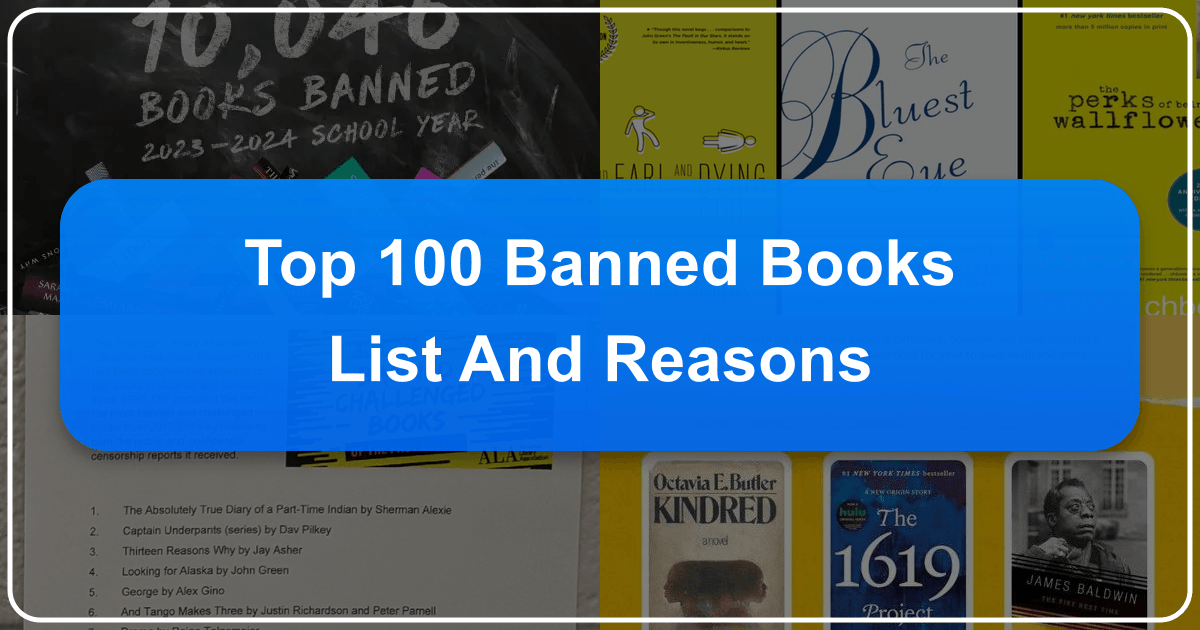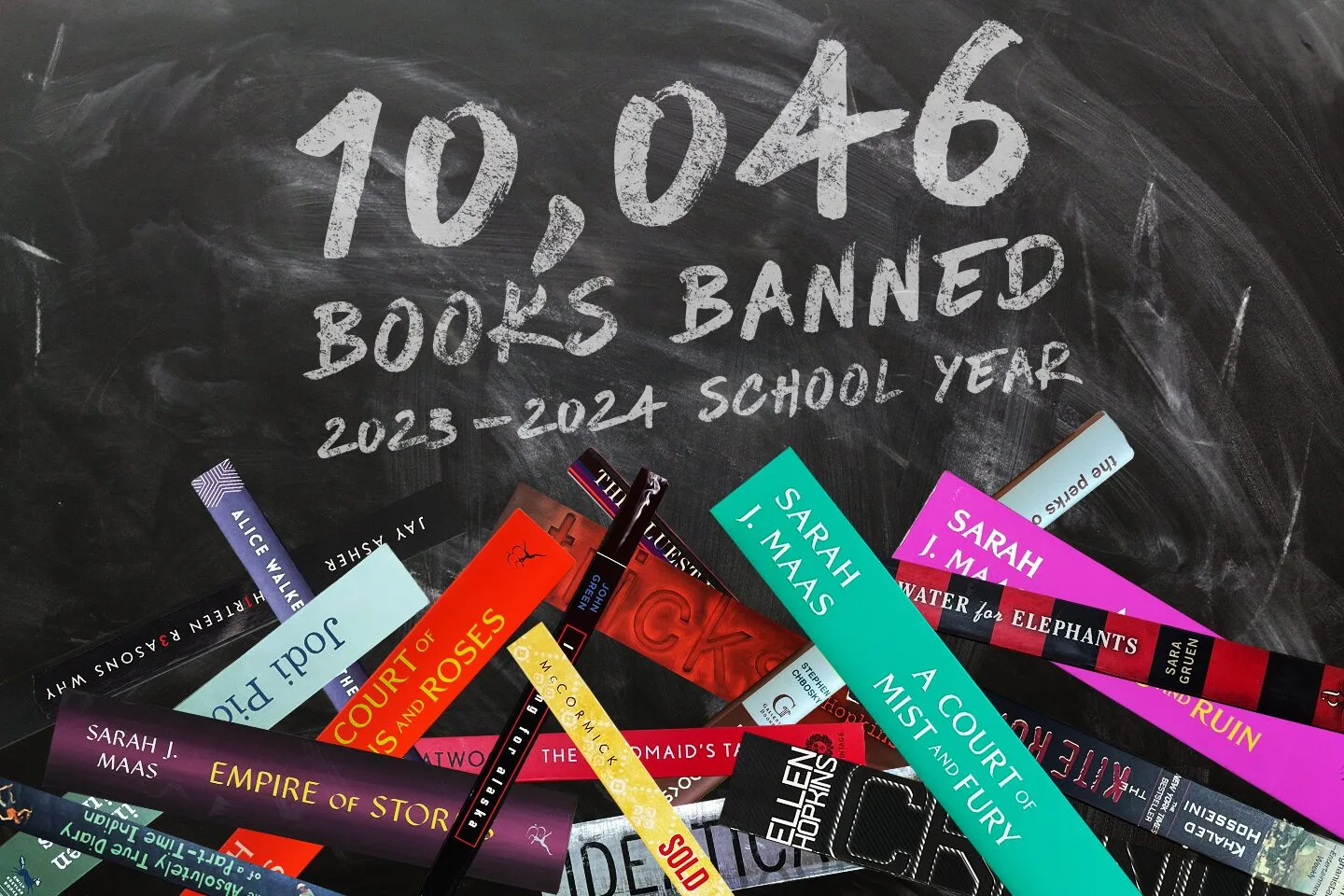Top 100 Banned Books: A Journey Through Censorship and Literary Freedom

The act of banning books, seemingly a relic of a bygone era, remains a disturbingly persistent reality in the modern world. The reasons behind these bans are as varied and complex as the books themselves, reflecting societal anxieties, evolving moral codes, and the ongoing struggle between freedom of expression and the desire to control information. Lbibinders.org’s “Top 100 Banned Books List and Reasons” offers a chilling glimpse into this ongoing battle, highlighting the breadth of literature targeted and the often-contradictory justifications offered for their suppression. This list serves not only as a catalog of prohibited texts but also as a testament to the enduring power of literature to challenge, provoke, and ultimately, enlighten. By examining these banned books across various genres, authorial styles, and cultural contexts, we can gain a deeper understanding of the forces that shape censorship and the vital importance of protecting intellectual freedom.

The Nature of Censorship: A Shifting Landscape
The reasons for banning books are rarely straightforward. While some might cite explicit content or age-inappropriateness, many bans stem from deeper societal anxieties. Lbibinders.org’s list reveals a complex tapestry of motivations, ranging from religious objections and political ideologies to concerns about racial or sexual content. Books challenging established norms, questioning authority, or presenting alternative perspectives often become targets. The subjective nature of these justifications underscores the arbitrary and often capricious nature of censorship.
Consider the impact of changing social mores. A book deemed offensive or inappropriate in one era might be celebrated as groundbreaking in another. This fluctuation highlights the inherent instability of censorship efforts, reflecting the dynamic and ever-evolving nature of societal values. The very act of banning a book often inadvertently elevates its profile, prompting increased interest and sparking wider discussions about the ideas it contains. This paradoxical outcome serves as a powerful reminder of the limitations of censorship as a tool for controlling ideas.

Religious and Moral Objections: A Recurrent Theme
A significant number of books on Lbibinders.org’s list have been banned due to religious or moral objections. These bans often target works containing sexually explicit content, profanity, or depictions of violence, deemed offensive or corrupting to moral values. The subjective interpretation of morality, however, varies widely across cultures and time periods. What one society considers morally objectionable, another might find artistically relevant or even socially essential. This discrepancy underscores the limitations of using a singular moral code as a basis for literary censorship. The resulting bans often restrict access to essential narratives, perspectives, and experiences that contribute to a rich and nuanced understanding of the human condition. The works deemed morally objectionable by some often serve as windows into diverse communities and cultures, offering valuable insights into human behavior and societal dynamics.
Political Ideology and Social Commentary: Targets of Suppression

Political ideologies and social commentary frequently become targets of censorship. Books challenging existing power structures, advocating for social change, or exposing injustices often face suppression. Lbibinders.org’s list contains numerous examples of books banned for their critiques of government policies, their promotion of revolutionary ideas, or their portrayal of marginalized groups. These bans demonstrate the inherent conflict between freedom of expression and the desire to maintain social order. By silencing dissenting voices, governments and other powerful entities attempt to control the narrative and prevent the dissemination of potentially subversive ideas.
However, the attempt to stifle dissent often backfires. The very act of banning a book highlights its subversive potential, leading to increased curiosity and potentially wider dissemination through underground channels. This highlights the power of literature to challenge established power dynamics and the inherent futility of suppressing dissenting opinions in the long run.
Genres and Themes Under Fire: A Diverse Range of Targets
Lbibinders.org’s “Top 100 Banned Books List and Reasons” demonstrates the broad scope of literary works targeted by censorship. The list encompasses a wide range of genres, including classics, contemporary fiction, non-fiction, poetry, and young adult literature. No genre is immune to the scrutiny of censors, and the reasons for banning span from perceived offensiveness to perceived threats to established norms.
Classics Under Siege: Challenging the Canon
Even established literary classics, revered for their artistic merit and lasting impact, have faced censorship. These bans often reflect shifting social values and evolving interpretations of these works. The banning of these classics highlights the fluidity of literary canons and the ongoing debates surrounding their relevance and appropriateness. The reasons for banning classics often reveal less about the inherent nature of the texts and more about the anxieties and prejudices of the censors themselves. The preservation and accessibility of these classics are essential to fostering critical thinking and understanding of our literary heritage.
Contemporary Fiction and the Exploration of Taboo Subjects: A Necessary Conversation
Contemporary fiction often grapples with taboo subjects, pushing the boundaries of acceptable discourse and challenging societal norms. These works, often exploring themes of sexuality, violence, or social injustice, are frequently targeted by censorship. These bans reflect a reluctance to engage in uncomfortable conversations about societal issues, a failure to address sensitive matters openly and honestly. The restriction of access to these works limits our collective understanding of human experiences and silences vital voices that offer alternative perspectives on difficult issues. These narratives are frequently instrumental in promoting empathy and critical analysis, essential for fostering a progressive and inclusive society.
Young Adult Literature: Shaping Minds and Sparking Controversy
Young adult literature, frequently intended to guide and educate young readers, is particularly susceptible to censorship. Books dealing with complex themes of identity, sexuality, or social inequality are often targeted for their perceived influence on developing minds. These bans often reflect an attempt to control the formation of young people’s values and beliefs. However, restricting access to literature that encourages critical thinking and explores diverse perspectives hinders the development of well-rounded individuals capable of navigating the complexities of the world. Such books contribute significantly to the development of empathy and understanding among young people, fostering tolerance and promoting inclusive perspectives.
Authors Under Attack: Voices Silenced, Perspectives Suppressed
The authors whose works appear on Lbibinders.org’s list represent a diverse range of backgrounds, experiences, and writing styles. The targeting of specific authors is often linked to their political views, their social commentary, or their depiction of controversial subjects. These bans effectively silence their voices and limit the dissemination of their ideas. The suppression of authors and their works represents a direct attack on intellectual freedom and limits the range of perspectives available to readers. The impact extends beyond the immediate suppression of these voices, creating a chilling effect on future authors who might be hesitant to tackle controversial topics for fear of censorship.
The Cultural Impact of Banned Books: A Legacy of Resilience
Despite the attempts to suppress them, banned books have had a profound cultural impact. The very act of banning a book often inadvertently elevates its profile, leading to increased interest and sparking wider discussions about the ideas it contains. These books become symbols of resistance against censorship and testaments to the enduring power of literature to challenge established norms and provoke critical thinking. Their influence extends far beyond their initial readership, inspiring adaptations, influencing artistic movements, and sparking ongoing conversations about freedom of expression. The legacy of banned books is a testament to the resilience of literature and the unwavering desire for intellectual freedom.
Lbibinders.org’s “Top 100 Banned Books List and Reasons” serves as a powerful reminder of the importance of protecting literary freedom and fostering a culture of open dialogue and critical engagement with diverse perspectives. By understanding the reasons behind these bans, we can better defend against future attempts to restrict access to information and limit the power of literature to shape our understanding of the world. The continued discussion and accessibility of these books are crucial in preserving our intellectual heritage and promoting a society that values freedom of expression above all else.